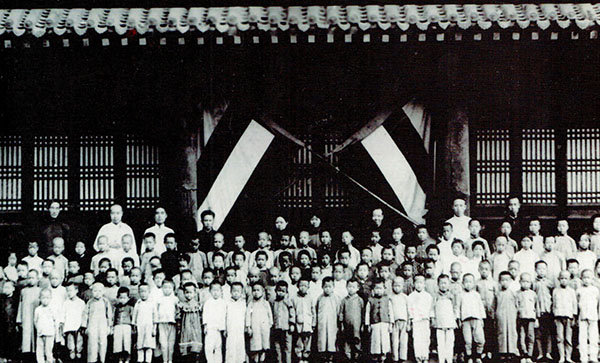 |
|
A 1921 photo of Yan Baohang (first from left, back row) with teachers and children at the charity school he founded in Liaoning province. Photo Provided to China Daily |
The 'Xi'an incident'
On Dec 12, 1936, Zhang, who had become disenchanted with Chiang's military strategy, gave orders for his superior to be kidnapped and detained in Xi'an, Shaanxi province. "Before that, Chiang had deployed a sizable part of the Nationalist army to wipe out the Communists, whom he saw as a threat. By detaining Chiang, Zhang hoped to force Chiang to cooperate with the communists. After being held for several days, Chiang agreed to the formation of a united front against the Japanese, and was released.
"Upon Chiang's release, Zhang accompanied him on a flight from Xi'an to Nanjing, the Nationalist capital at the time, and was immediately placed under house arrest," Guan said.
According to a memoir Yan wrote in 1962, Madame Soong and her brother, T.V. Soong, a prominent politician, invited him to a meeting three days after Chiang's return. They asked Yan to negotiate the release of a number of top-level Nationalist officials and 50 US planes that were under the control of Zhang's generals in Xi'an, in exchange for Zhang's eventual freedom. Yan brokered the deal, and the men and the planes were soon back in Nanjing. Zhang, however, remained under house arrest for half a century, first on the mainland and then Taiwan.
"My father felt cheated. In the first few years after the 'Xi'an Incident', he tried everything to gain Zhang's freedom, but in vain," Yan Mingguang said.
Yan and Zhang met for the last time in February 1937, and in September Yan joined the CPC and was tasked with collecting intelligence.
By the summer of 1945, Japan was the last Axis country still fighting, despite its hopeless situation.
"But Japan still had one trump card - the 1.2-million-strong 'Kwantung Army', stationed in Northeastern China and seen as its mightiest force. It was at full strength and was expected to guard this last piece of ground 'for the Emperor', just in case the Japanese mainland fell," Guan said.
"The Americans hoped that the Soviets would attack and eliminate this giant army, but mindful of the powerful response it might unleash, Stalin hesitated. That's when Yan's crucial piece of information arrived," he added.
The Soviet Communist Party had asked the CPC for assistance, and Yan learned that Nationalist intelligence agents had detailed information about the army's deployment and defensive plans.
"An old friend of Yan's happened to be the brother-in-law of the Nationalist official in charge of the classified files. After much persuasion, the official agreed to 'lend' the files to Yan, for three days," Guan said. "It didn't take long for the information, which even included the names of low-level Japanese commanders, to reach the Soviets, who launched an attack on Aug 8, 1945. The move sealed Japan's fate, and the country surrendered on Aug 15.
"For my father, a Northeast native, that triumph, coming 14 years after my family left home during the Japanese invasion, was highly emotional," said Yan Mingfu, the younger brother of Yan Mingguang. "I remember riding on my father's shoulders during a demonstration against the invaders in Wuhan in 1938. I was about 7 at the time."